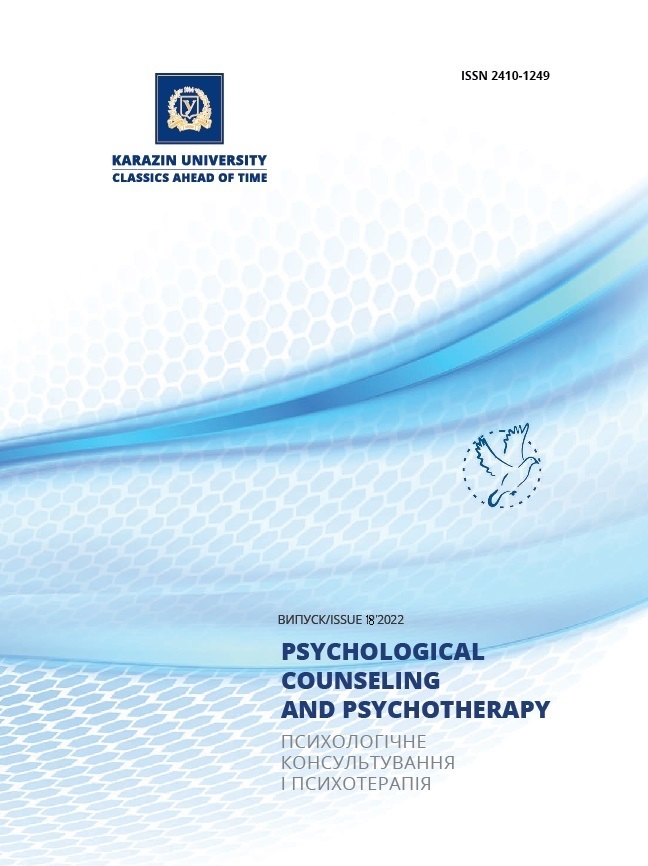Post-War Ukrainа: Psychological and Psychotherapeutic Perspectives
Abstract
Increased funding: one of the biggest problems facing psychologists in Ukraine is the lack of resources and funding. Increased funding for mental health services and training could help improve the quality of care that psychologists can provide to their patients. The necessary recognition of mental health and the role of psychologists in providing care can help reduce stigma and increase collaboration between psychologists and other health professionals. More resources and educational materials in Ukrainian are needed to improve access to information and resources for Ukrainian psychologists, and to support the development of a strong, locally focused research base. Creating more jobs for psychologists, especially in underserved areas, can help increase access to mental health services for those who need them. Continuous education: psychologists. Education and public awareness can help encourage more people to seek help from psychologists and other mental health professionals. Of course, these steps are only a starting point and a solution to the complex problems faced by psychologists in Ukraine
Downloads
References
Bereziuk, S., Pronko, L., & Samborska, O. (2020). The Phenomenon of Political Power in Ukraine. European Journal of Sustainable Development, 9(2), 488. https://doi.org/10.14207/ejsd.2020.v9n2p488
Horton R. (2022). Offline: Ukraine-difficult lessons for global health. Lancet. 9, 399 (10333) 1370. https://doi.org/10.1016/S0140-6736(22)00653-5. PMID: 35397855.
Panok, V., Pavlenko, V., Korallo, L., (2006). Psychology in the Ukraine. Psychologist-Leicester. 19.12 730.
Pavlenko, V. (2003). The Influence of some Topics from School Textbooks on Ethnic Stereotype Formation. In Crossing borders, changing minds, J.S. Fure & L.A. Ytrehus (Eds.) (pp. 55–57). Oslo: Høyskoleforlaget-Norwegian Academic Press.
Pavlenko, V., Kryazh, I., Ivanova, O. & Barrett, M. (2001). Age characteristics of social identifications and ethno-national beliefs in Ukraine. In Development of national, ethnolinguistic and religious identities in children and adolescents. M. Barrett, T. Ryazanova & M. Volovikova (Eds.) (pp.105–132). Moscow: Institute of Psychology, Russian Academy of Science.
Stevenson, A., Cultural issues in psychology: A student's handbook. Routledge, 2009.
Shevlin, M., Hyland, P., Karatzias, T., Makhashvili, N., Javakhishvili, J., Roberts, B. (2022). The Ukraine crisis: Mental health resources for clinicians and researchers. J. Trauma Stress. 35(3), 775-777. https://doi.org/10.1002/jts.22837. PMID: 35366367;
Fontanarosa, P.B., Flanagin, A., Golub, R.M. (2022). Catastrophic Health Consequences of the War in Ukraine. JAMA. 327(16), 1549-1550. https://doi.org/10.1001/jama.2022.6046. PMID: 35363251.
Burlaka, V., et al. (2014). Perceived barriers to mental health services: A mixed-method study with Ukrainian college students. European Journal of Higher Education, 4(2), 167 183.
Panok, V., (2016). Theoretical justification of applied psychology. Psychology and society, 1(63), 91-108. (in Ukrainian)
Shoib, S., Zharkova, A., Pal, A., Jain, N., Saleem, S.M., Kolesnyk, P. (2022). Refugees and Mental health crisis in Ukraine. Asian J. Psychiatr. 74, 103169. https://doi.org/10.1016/j.ajp.2022.103169. PMID: 35691058.
Edirippulige, S., Levandovskaya, M., Prishutova, A., (2013). A qualitative study of the use of Skype for psychotherapy consultations in the Ukraine. J. Telemed. Telecare. 19(7), 376-378. https://doi.org/10.1177/1357633X13506523. PMID: 24218348.
Bogdanov, S., Augustinavicius, J., Bass, J.K., Metz, K., Skavenski, S., Singh, N.S., Moore, Q., Haroz, E.E., Kane, J., Doty, B., Murray, L., Bolton, P. (2021). A randomized-controlled trial of community-based transdiagnostic psychotherapy for veterans and internally displaced persons in Ukraine. Glob. Ment. Health. (Camb). 8, e32. https://doi.org/10.1017/gmh.2021.27. PMID: 34513001; PMCID: PMC8392687.
Kechur, R., Yaskevych, O., Turezka, K., (2021). Psychoanalytic style and its relation to literature. Psychological Journal, 7(5), 85-96. (in Ukrainian)
Kechur, R., Yaskevych, O., Turezka, K., (2020). Aesthetic personality orientation and its connection with empathy. Psychological Journal, 6(5). 239-248. (in Ukrainian)
Birkle, S.M., Vallejo-Valdivielso, M., Martsenkovskyi, D., Yilmaz, H., Sebela, A., Ghosh, S., Awhangansi, S., Kodra, V., Mirković, A. (2019). Early Career Perspectives. Z Kinder Jugendpsychiatr Psychother. 47(1), 90-92. https://doi.org/10.1024/1422-4917/a000643. PMID: 30628863.
Frankova. I., Vermetten, E., Shalev, A.Y., Sijbrandij, M., Holmes, E.A., Ursano, R., Schmidt, U., Zohar, J. (2022). Digital psychological first aid for Ukraine. Lancet Psychiatry. 9(7), e33. https://doi.org/10.1016/S2215-0366(22)00147-X. PMID: 35526557.
Ahmad, J., Okwuowulu, C., Sanusi, B., Bello, S.A., Talabi, F.O., Udengwu, N., Gever, V.C. (2022). Impact of social media-based dance therapy in treating depression symptoms among victims of Russia-Ukraine war. Health Promot. Int. 37(6), 172. https://doi.org/10.1093/heapro/daac172. PMID: 36508393.
Fedko, S.L., Kurbatova, A., Remesnyk, N., Matviienko, I., Parasiei-Hocher, A., Kryvda, N., Elzahraa, H.F. (2021). Cultural Awareness in Contemporary Mental Health Practice. Wiad Lek., 74(11), 2762-2767. PMID: 35023489.
Goto, R., et al. (2023). Mental health services in Ukraine during the early phases of the 2022 Russian invasion. The British Journal of Psychiatry, 222(2). 82-87.
Oviedo, L., Seryczyńska, B., Torralba, J., Roszak, P., Del Angel, J., Vyshynska, O., Muzychuk, I., Churpita, S. (2022). Coping and Resilience Strategies among Ukraine War Refugees. Int. J. Environ. Res. Public. Health. 19(20), 13094. https://doi.org/10.3390/ijerph192013094. PMID: 36293686; PMCID: PMC9602814.
Singh, N.S., et al. (2021). Experiences of mental health and functioning among conflict-affected populations: A qualitative study with military veterans and displaced persons in Ukraine. American Journal of Orthopsychiatry, 91(4), 499.
Іmas, Y., Lazarieva, O., (2017). Pre-conditions and modern development of specialities in physical therapy and ergo-therapy in Ukraine. Physical education, sport and health culture in modern society, 2(38), 10-15.
Della, S.S., Grafman, J. (2022). Invasion of Ukraine: It can't be business as usual in science. Cortex. 150, 165-166. https://doi.org/10.1016/j.cortex.2022.04.002. PMID: 35422320.
Barnes, M.E., Greer, S. (2016). The history specialist in psychology: From avocation to professionalization. Hist. Psychol. 19(3), 192-208. https://doi.org/10.1037/hop0000027. PMID: 27442030.
Calam, R., El-Khani, A., Maalouf, W. (2022). Editorial Perspective: How can we help the children of Ukraine and others affected by military conflict? Child. Adolesc. Ment. Health. 27(3), 294-296. https://doi.org/10.1111/camh.12581. PMID: 35892181.
Baraka, M.K., et al. (2021). Cross-Cultural Counselling Supervision in Ukraine. International Journal for the Advancement of Counselling, 43, 320-339








